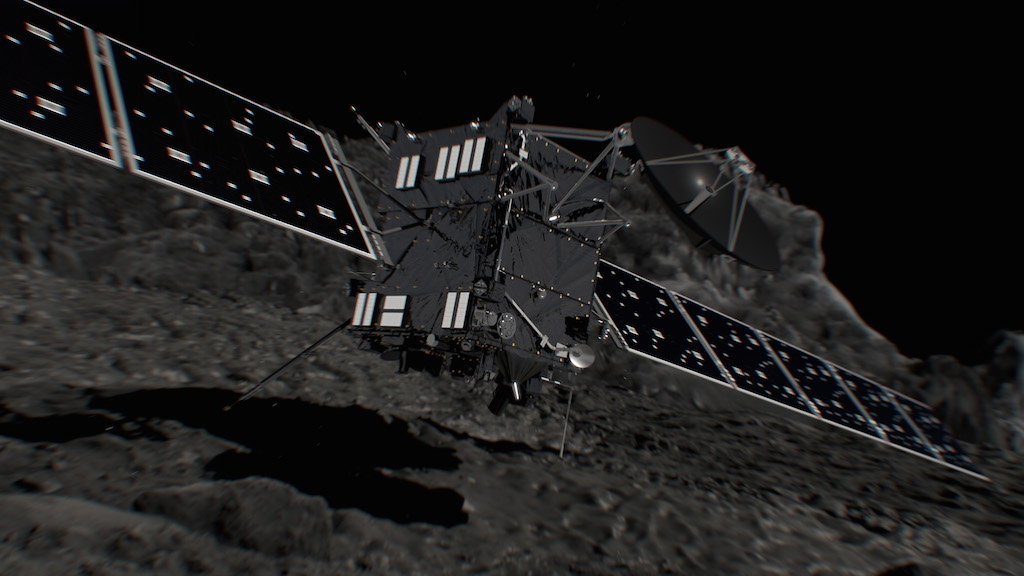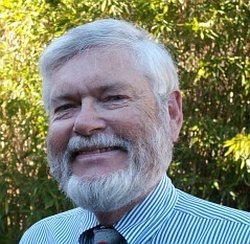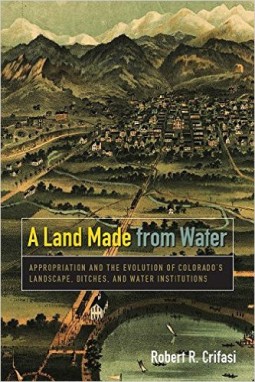 Rosetta [feature starts at 5:27]
Rosetta [feature starts at 5:27]
The Rosetta Space Mission has been in flight for ever 12 years and will be ending with a dramatic crash this Friday morning around 10:40 UT (4:40 am Mountain time) – it’s an event that will be watched and talked about by people around the world.
Rosetta is run by the European Space Agency, with contributions from NASA. The mission’s goals have been to study a comet to learn not only about how comets work, but what comets can tell us about the origins of the solar system, and perhaps connections to water and life. Rosetta was the first spacecraft to orbit and escort a comet as the comet approached and flew past the Sun, and Rosetta also carried a smaller spacecraft, named Philae, that performed the first landing on a comet.
The Rosetta mission has a very strong Colorado connection, since one of the instruments – an ultraviolet spectrograph called “Alice” – was operated from the offices of Southwest Research Institute right here in Boulder.We have three members of the Rosetta team here in the studio to talk about Rosetta, comets, and the rather exciting ending planned for the spacecraft in just a few days. Our guests are Andrew Steffl from Southwest Research Institute, John Pineau from Stellar Solutions, and John Noonan who is a recent astronomy graduate from the University of Colorado and is working at Southwest Research Institute.
There’s more information on the Rosetta Blog about how to follow the final events of the Rosetta mission.
Hosts: Joel Parker, Alejandro Soto
Producer and Engineer: Joel Parker
Executive Producer: Susan Moran
Additional Contributions: Beth Bennett, Shelley Schlender
Listen to the show:
Podcast: Play in new window | Download (Duration: 27:34 — 18.8MB)
Subscribe: RSS





 Those skills do not necessarily overlap, but when they do, they not only can produce wonderful works of speculative fiction based on hard science, but they also can generate exciting new ideas for science research.
Those skills do not necessarily overlap, but when they do, they not only can produce wonderful works of speculative fiction based on hard science, but they also can generate exciting new ideas for science research. Dr. Benford also is a Nebula Award winning author of over twenty novels, including “Timescape”, “Jupiter Project”, “Artifact”, and “Against Infinity”, and the 6-book “Galactic Center Saga” series. He also is an advisor on the
Dr. Benford also is a Nebula Award winning author of over twenty novels, including “Timescape”, “Jupiter Project”, “Artifact”, and “Against Infinity”, and the 6-book “Galactic Center Saga” series. He also is an advisor on the 
 Host Beth Bennett interviews Bob Crifasi, author of A Land Made of Water (starts at 4’55”). Bob works in water management and planning and is an environmental scientist with over 25yr experience. He was the Water Resources Administrator for the city of Boulder’s Open Space and Mountain Parks Dept. He has served on board of directors of 11 ditch companies and as the president of several, supervising all aspects of ditch operation.
Host Beth Bennett interviews Bob Crifasi, author of A Land Made of Water (starts at 4’55”). Bob works in water management and planning and is an environmental scientist with over 25yr experience. He was the Water Resources Administrator for the city of Boulder’s Open Space and Mountain Parks Dept. He has served on board of directors of 11 ditch companies and as the president of several, supervising all aspects of ditch operation.